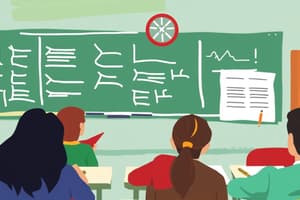Podcast
Questions and Answers
What is the primary purpose of non-tests in learning?
What is the primary purpose of non-tests in learning?
- To compare student performance with their peers
- To assess student knowledge through forced responses
- To facilitate learning experiences and classroom activities (correct)
- To evaluate teacher performance in the classroom
What do non-tests allow students to do, according to Reganit et al. (2010)?
What do non-tests allow students to do, according to Reganit et al. (2010)?
- Manifest their acquired knowledge and skills (correct)
- Demonstrate their teaching skills
- Compare their knowledge with their peers
- Evaluate their own learning outcomes
What is a characteristic of non-tests, according to the text?
What is a characteristic of non-tests, according to the text?
- They are only used for summative assessments
- They require students to provide immediate responses
- They force students to answer questions correctly
- They do not force students to give their responses (correct)
What type of learning experience do non-tests focus on?
What type of learning experience do non-tests focus on?
What is the role of non-tests in the learning process?
What is the role of non-tests in the learning process?
Flashcards are hidden until you start studying
Study Notes
Non-Tests in Learning
- Non-tests are instrumental in learning, focusing on learners, classroom assessment activities, and learning experiences.
- Unlike traditional tests, non-tests do not force students to respond in a specific way.
- Instead, non-tests allow students to demonstrate their acquired knowledge and skills freely.
- This approach enables learners to manifest their understanding of the subject matter, as noted by Reganit et al. (2010).
Studying That Suits You
Use AI to generate personalized quizzes and flashcards to suit your learning preferences.




